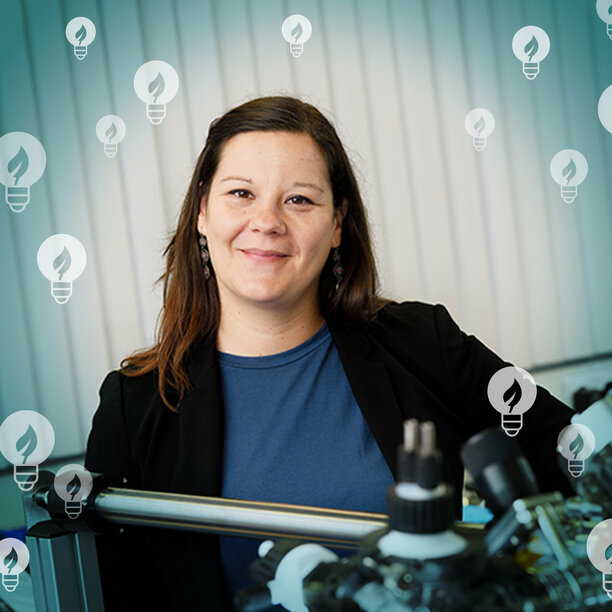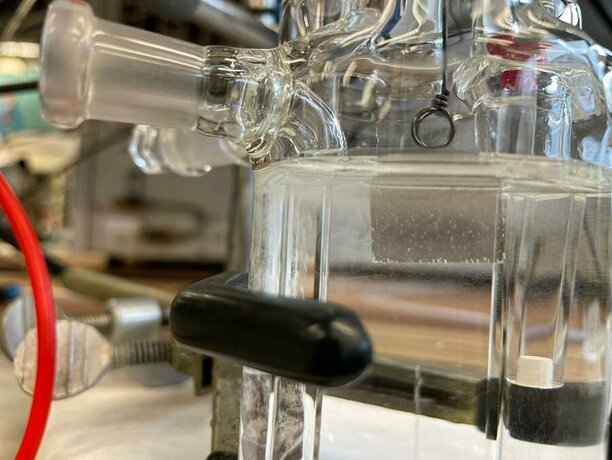Energy from electrochemistry
When joining Eindhoven University of Technology in April 2019, chemist Marta Costa Figueiredo brought a wagonload of experience in electrochemistry research and engineering to the table. After studying chemistry at Porto University in Portugal, she moved to Spain where she obtained her PhD at the Universidad de Alicante. Several postdoc periods followed, bringing her from Finland to Leiden and Denmark. And although her aim had always been to pursue an academic career, when the opportunity presented itself she even made a brief switch to industry.
‘My work at the Dutch company Avantium, from 2017 to 2019, was an intense learning experience,’ she says. ‘In academia I had always been in my comfort zone. But working in a company meant that I suddenly had to translate my scientific interests into practical guides for technicians and engineers. I needed to find a common language, and I quickly learnt how to motivate a team for a common goal. That short but intense period surely helped me build confidence in my own capabilities.’
Motivated by PhD students
Though she was very happy working in industry, when Costa Figueiredo was approached by TU/e with the message that they were looking for someone with her specific expertise, she reevaluated what she wanted and decided to switch back to academia. A move she hasn’t regretted since. ‘I get a lot of energy from working with PhD students. I learn from them every day.’ Her experience in industry also improved her teaching, she says. ‘Even though PhD students have a strong focus on their own project, I always try to present them with the bigger picture and make them feel part of a team.’
In her research, Costa Figueiredo focusses on electrosynthesis and energy related electrochemistry. Her main aim is to understand, develop and optimize electrochemical reactions under practical relevant conditions in order to advance the usage of electrochemistry in industry. Among others, she is developing new types of catalysts and new synthetic routes to produce bulk compounds from waste materials, like biomass and carbon dioxide. She gives an example. ‘We are currently working on a novel route to produce urea from CO2 and nitrates from waste water. We convert nitrates to ammonia and add CO2 to it to produce urea, which is used in fertilizers, but also in many different resins and plastics. These kinds of circular and small scale solutions are crucial for the energy transition, since they allow on site solutions and diminish the transport of chemical resources.’
New class of catalysts
When it comes to catalysis, the main challenge is to develop efficient and stable catalysts made out of new materials. ‘Currently, many catalysts rely on platinum, which is rather expensive and not abundantly available,’ Costa Figueiredo explains. ‘We want to mimic their properties with more sustainable alternatives.’ To do so, the chemists need to understand the electrochemical reactions first. ‘What are the reaction mechanisms? What parameters influence the reaction rate? What is absorbing what? Are there any poisonous intermediates formed?’ Then they start looking for materials with catalytic properties. ‘We usually start from an existing catalyst. We then try to replace the expensive metal by something more abundant and start changing shapes and sizes of the catalyst. When our material starts to show the desired behavior, we use spectroscopy techniques to see why it works the way it does. And then we stepwise improve the material to tune out unfavorable effects.’
As a Principal Scientist within the EIRES focus area Chemistry for Sustainable Energy Systems, Costa Figueiredo is actively working towards a demonstrator called the Dutch Electrolyzer. Upscaling an electrolyzer to a MW scale poses interesting scientific challenges, she says. ‘Although electrochemistry has been around for centuries, electrochemical engineering is a rather new branch of research. How do you apply electrochemical principles at industrial scale? And how can we engineer robust and reliable systems? The only way to do this is just jump in and start producing something. Along the road, we will stumble upon obstacles we will have to overcome to make this a reality.’
Costa Figueiredo feels very much at home within EIRES. ‘I value the fact that the institute brings people from a very diverse background together. And I really like it that the built environment is an explicit part of the institute. The involvement of that discipline urges me to think about how new solutions will be implemented in practice, and what that means for the solutions I come up with. To me, EIRES is a perfect microsphere where I can conduct academic research that leads to applications to improve our world.’

